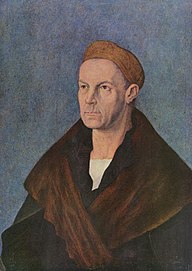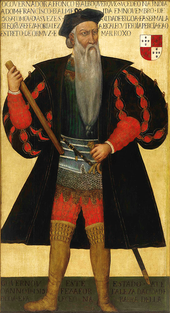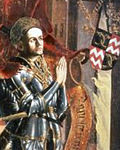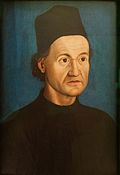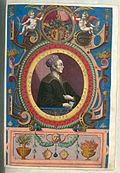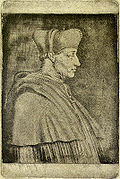1510
Portal history | Portal Biographies | Current events | Annual calendar
◄ |
15th century |
16th century
| 17th century
| ►
◄ |
1480s |
1490s |
1500s |
1510s
| 1520s
| 1530s
| 1540s
| ►
◄◄ |
◄ |
1506 |
1507 |
1508 |
1509 |
1510
| 1511
| 1512
| 1513
| 1514
| ►
|►►
| 1510 | |
|---|---|
|
Sandro Botticelli dies in Florence. |
Jakob Fugger becomes the sole owner of the Fugger bank . |
| Hans Baldung completes the margrave table . | |
| 1510 in other calendars | |
| Armenian calendar | 958/959 (turn of the year July) |
| Ethiopian calendar | 1502/03 |
| Aztec calendar | 4th house - Nahui Calli (until the end of January / beginning of February: 3rd Feuerstein - Jei Tecpatl ) |
| Buddhist calendar | 2053/54 (southern Buddhism); 2052/53 (alternative calculation according to Buddhas Parinirvana ) |
| Chinese calendar | 70th (71st) cycle
Year of the Metal Horse庚午 ( at the beginning of the year Earth-Snake 己巳) |
| Chula Sakarat (Siam, Myanmar) / Dai calendar (Vietnam) | 872/873 (turn of the year April) |
| Dangun era (Korea) | 3843/44 (October 2-3) |
| Iranian calendar | 888/889 |
| Islamic calendar | 915/916 (turn of the year April 9/10) |
| Jewish calendar | 5270/71 (September 4th / 5th) |
| Coptic calendar | 1226/27 |
| Malayalam calendar | 685/686 |
| Seleucid era | Babylon: 1820/21 (turn of the year April)
Syria: 1821/22 (turn of the year October) |
| Spanish era | 1548 |
| Vikram Sambat (Nepalese Calendar) | 1566/67 (turn of the year April) |
In 1510 , Portugal used its naval dominance in the Indian Ocean , which it had won the previous year in the Battle of Diu , to conquer the city of Goa in India, which after a brief setback led to the consolidation of Portuguese India .
In Europe , the League of Cambrai , which was directed against the Republic of Venice , collapsed after Venice, with diplomatic skill, France under King Louis XII. could isolate.
In Erfurt there is renewed unrest between students and craftsmen of the city and in Brandenburg 38 Jews are burned for alleged desecration of the host . Hamburg becomes a free imperial city and the North Sea coast is affected by several storm surges , which cause even more serious damage because the dikes have only been patched up after last year's floods .
Events
Politics and world events
Holy Roman Empire
Italian Wars / League of Cambrai

After military defeats , the new Venetian army commander Andrea Gritti can defeat Louis XII. of France stabilize. At the same time, through successful diplomatic negotiations with its opponents, who pursue very different goals, and against minor territorial cessions, the Republic of Venice succeeds in concluding a peace with Emperor Maximilian I and Ferdinand II of Aragon , thereby isolating France. Pope Julius II. Stands on February 24 the fine imposed on the city excommunication again. After a little over a year, the alliance of the League of Cambrai against the Maritime Republic ends .
Antonio Grimani , banished from Venice for high treason in 1499 , is allowed to return to his hometown after more than ten years and generous payments from his family. He receives the office of Procuratore di sopra and acts as a generous patron. Grimani contributes to the cost of building the old proxy offices and has the roof of the campanile , which had been destroyed by an earthquake, restored, for which he donated the gilded figure of the Archangel Gabriel on top.
Reichstag in Augsburg
- At the Reichstag in Augsburg , held in the city palace of the banker Jakob Fugger , Hamburg is declared a free and immediate imperial city . Denmark does not recognize this declaration.
Other events in the empire
Persecution of Jews in Brandenburg

At the beginning of the year, a gold-plated monstrance and two consecrated hosts are stolen from the church in the Havelland village of Knoblauch . The thief, the Christian tinker Paul Fromm from Bernau , declares under the torture that he had sold one of the hosts to a Jew in Spandau . This triggers a series of accusations, persecutions and arrests of Jews in many cities in the Brandenburg region . Around 100 of those arrested, including the most respected of the communities, were taken to the royal seat of Berlin for further investigation and brought before a court there. After the verdict was pronounced on July 19 on the Neuer Markt in front of the Marienkirche , 38 Jews were burned on a multi-story pyre at the place of execution in front of the Georgentor for alleged desecration of the host, and at least two others who had since been baptized were beheaded. The thieving tinker is also executed. As a result, the Jews are expelled from the Mark Brandenburg . This has the advantage for the sovereign and also for the citizens that debts to Jewish merchants or bankers do not have to be paid off. Jews were not allowed to resettle in Berlin until 1539 .
Erfurt student heat
In Erfurt , after the fall and execution of councilor Heinrich Keller and the escape of other councilors in the previous year , unrest broke out again . The reason for this is the city-based university. The humanists teaching in Erfurt around 1500 attract students from all parts of Europe, which makes the University of Erfurt an important economic factor. The students, who often come from affluent backgrounds, however, openly make pacts with the councilors who were expelled the previous year and often provocatively display their wealth. They trigger a second wave of acts of violence, which finds its way into the city chronicle as Erfurt student heat. The Erfurt Collegium Maius and other university buildings are stormed and damaged by the craftsmen, many students leave Erfurt as a result. Until 1514 things were still fermenting in the city between the council and the guilds, the reputation of Erfurt was permanently ruined by the events. Furthermore, there is a protracted trade war with the Saxon dukes in the next few years , which also has long-term negative effects on the economic situation of the city. Even Martin Luther , who at this point in the Augustinian monastery lives and preaches, is an eyewitness to the events.
Portuguese Empire
Portuguese India
On March 1, the former Viceroy of Portuguese India , Francisco de Almeida , is killed in a skirmish with locals on the coast of Table Bay in the Cape of Good Hope . The clashes come after the Portuguese tried to steal cattle from the Khoikhoi to supply fresh meat on board. The incident leads Portuguese ships to avoid going ashore at the Cape of Good Hope from this point on.
Under Almeida's successor, Governor Afonso de Albuquerque, the Portuguese are expanding their colonial empire in India . In spring they attack the Sultanate of Bijapur, ruled by the Adil Shahi dynasty, and conquer Goa . The sultanate, which is confronted at the same time with a war against the Hindu empire Vijayanagar and the northern neighboring sultanate Ahmadnagar , was able to recapture the place at short notice in August, but on November 25 the Portuguese succeeded in finally taking the cities of Goa and Panaji . From this point on, Goa becomes the capital of the Portuguese-India colony , from where not only sea trade to Southeast Asia and Europe is controlled, but also Christian proselytizing begins.
Brazil
Survivors of a shipwrecked French ship are settling for the first time in the area around today's Salvador da Bahia in Brazil . Among them is the Portuguese Diogo Álvares Correia, who is given the name Caramuru ( lamprey ) by the local Tupinambá tribe , whom he impresses with his shooting skills .
Portugal
The Portuguese towns of Aljustrel and Castro Verde receive city rights.
Spain and its colonies
- Pedro Navarro conquers the city of Tripoli in North Africa for Spain .
- Spanish troops capture Algiers and Bejaia in North Africa.
- The governor of Veragua , Diego de Nicuesa , founds the city of Nombre de Dios in what is now Panama.
- The Atlantic slave trade begins. The first ship with 50 black slaves sails for Haiti from a Portuguese trading company in West Africa.
Northern and Eastern Europe
- April: The Danish-Hanseatic War between Lübeck and the Wendish cities of the Hanseatic League on the one hand and the main enemy Denmark under Admiral Jens Holgersen Ulfstand begins with the Hanseatic League's official declaration of war on Denmark. The Hanseatic fleet sacked Bornholm again in July and, united with a Swedish squadron, the coast of Skåne was devastated. In the same year the people of Lübeck also plunder and destroy Nakskov , where an important Danish warship is located, but their fleet is defeated by the Danish admiral Henrik Krummedike off Nakskov . However, Danish counter-attacks on Travemünde and Warnemünde fail with high losses.
- Republic of Pskov : Pskov is from the Grand Duchy of Moscow under Vasily III. subject. This ends the tradition of the Veche in Russia.
Asia
- November 29 or December 1 : The Persian Shah Ismail I from the Safavid dynasty defeats the Uzbek khanate under Mohammed Scheibani , whose skull is made into a drinking bowl.
- Mingyinyo founded the Taungu dynasty in what is now Myanmar .
economy
- Jakob Fugger takes over the management of the Augsburg trading house
science and technology
- Heinrich Cornelius Agrippa von Nettesheim wrote his three-volume book De Occulta Philosophia about the well-known magic of the West. The universal scholar, who is also interested in mineralogy , is also a mountain ridge for the city of Cologne .
Culture
| Culture | |
|---|---|
|
architecture
- The spire is placed on the St. Mark's Tower in Venice .
- From 1510 onwards, construction work on Cologne Cathedral was gradually stopped. For the next more than 300 years , the unfinished cathedral determined the silhouette of the city.
Visual arts
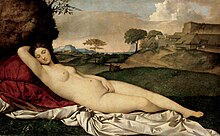
- The Italian Renaissance painter Giorgione completed one of his last works with the Slumbering Venus .
- The German painter Hans Baldung completes the margrave panel , which, in addition to Anna herself , shows the donor of the picture, Margrave Christoph I of Baden , among others .
- The German Renaissance painter, engraver and master builder Albrecht Altdorfer completes the oil painting deciduous forest with Saint George . The picture, painted with oil paint on parchment and mounted on linden wood, shows a scene from the legend of St. George slaying the dragon .
- The Florentine painter Ridolfo Ghirlandaio produced the painting Adoration by the Shepherds in oil on wood .
literature
- The Liber vagatorum is published for the first time in Pforzheim . The three-part booklet, whose author is unknown, is a synopsis of the “beggar types” and their “way of working” in the early modern period.
- Out of private interest without an official mandate, Werner Schodoler begins work on the Federal Chronicle , an important Swiss illustrated chronicle .
religion
- January 10th : John VIII. Grimholt succeeds Wilhelm Westphal, Bishop of Lübeck , who died at the turn of the year . On April 8th he is confirmed in his office.
- The dispute between the Pforzheim humanist Johannes Reuchlin and Johannes Pfefferkorn over his announcement that the rabbis' literature will be eliminated begins. After Johannes Reuchlin was convicted of heresy in 1520 , the " dark man letters " directed against the Dominicans appeared from the humanistic circle of friends of Reuchlin .
- The polymath Heinrich Cornelius Agrippa von Nettesheim , together with other representatives of Emperor Maximilian I, was sent to the court of Henry VIII of England to influence his politics. Agrippa met John Colet, among others, at a lecture on Paulinism at the University of Oxford .
In November, Martin Luther travels to Rome to protest on behalf of his Erfurt Convention against the unification of the strict observants with the more liberal Augustinian monasteries, ordered from above . There he takes part in a general confession and slides on his stomach up the "Holy Stairs" on the Lateran in order to obtain forgiveness of sins for himself and his relatives. At this point in time he did not yet doubt the Roman practice of penance, but was appalled by the lack of seriousness and moral decay that he encountered in Rome.
Disasters
On September 5th / 6th , a severe storm surge hit the Jade Bay on the North Sea coast , many of which were broken by the second Cosmas and Damian floods of the previous year, which were only poorly repaired. This so-called St. Magnus flood was followed on November 1st by the All Saints Flood in 1510 , which hit the entire North Sea coast from Flanders to Eiderstedt. Many dikes are breached again and large coastal areas are flooded. The water rises to 3.80 meters above MThw .
Born
Date of birth saved
- March 27 : Katharina von Pfalz-Simmern , abbess in the Kumbd monastery († 1572 )
- March 30th : Antonio de Cabezón , Spanish composer and organist († 1566 )
- July 22nd : Alessandro de 'Medici , Duca della città di Penna and Duke of Florence († 1537 )
- August 24 : Elisabeth von Brandenburg , Duchess of Braunschweig-Calenberg-Göttingen and Countess zu Henneberg († 1558 )
- August 30 : Ursula von Mecklenburg , last Catholic abbess of the Poor Clare monastery in Ribnitz († 1586 )
- October 6 : John Caius , English court physician, enabled the re-establishment of Gonville Hall († 1573 )
- October 28 : Francisco de Borja , third general of the Jesuits († 1572 )
- December 28 : Nicholas Bacon , English lawyer, judge and Lord Chancellor († 1579 )
Exact date of birth unknown
- Barthélémy Aneau , French writer and humanist († 1561 )
- Tullia d'Aragona , Roman courtesan, poet and philosopher († 1556 )
- François Clouet , French painter († 1572 )
- Franz Davidis , Unitarian theologian († 1579 )
- Francisco Vásquez de Coronado , Spanish explorer († 1554 )
- Baldassare Lanci , Italian artist and architect († 1571 )
- John Marcellus , German philologist and poet († 1551 / 52 )
- Matsunaga Hisahide , Japanese daimyo († 1577 )
- Robert Recorde , English physician and mathematician († 1558 )
- Kaspar Schlumpf , Swiss merchant and mayor († 1587 )
- Piero Strozzi , Florentine nobleman and condottiere († 1558 )
Born around 1510
- 1509/10 : Anna Jansz , Dutch martyr of the Anabaptist movement († 1539 )
- Juan Bermudo , Spanish music theorist and composer († around 1565 )
- Ulrich Campell , Swiss reformer and Rhaeto-Romanic song writer († around 1582 )
- Hieronymus Cock , Dutch art publisher, painter and engraver († 1570 )
- Philibert de l'Orme , French architect and author for stonemasonry and vaulting techniques († 1570 )
- William Howard, 1st Baron Howard of Effingham , English nobleman († 1573 )
- Johann VI. von der Leyen , Archbishop and Elector of Trier († 1567 )
- Ambroise Paré , French surgeon († 1590 )
- Anne Seymour, Duchess of Somerset , English nobleman and literary patron († 1587 )
- Isabel Moctezuma , Aztec princess, daughter of Moctezuma II. († 1550 / 51 )
Died
First half of the year
- January 5 : Johannes Nauclerus , German scholar and first rector of the University of Tübingen (* 1425 )
- January 13 : Florian Waldauf , Tyrolean knight in the service of Emperor Maximilian and member of the order of jugs (* around 1450 )
- January 27th : Thomas Brandon , English courtier and diplomat
- February 1 : Sidonie of Bohemia , Duchess of Saxony (* 1449 )
- February 28 : Juan de la Cosa , Spanish navigator, cartographer and explorer (* around 1449 or 1460 )
- March 1 : Francisco de Almeida , Portuguese navigator and military man, governor of Portuguese India (* 1450 )
- March 10 : Johann Geiler von Kaysersberg , German preacher and writer (* 1445 )
- March 12th : Mihnea I. cel Rău , voivode of Wallachia (* around 1462 )
- around March 27th : Beatrice de Frangepan , Croatian nobleman, Margravine of Brandenburg-Ansbach (* 1480 )
- April 19 : Ulrich Fugger , German businessman and banker (* 1441 )
- April 20 : Wilwolt von Schaumberg , German mercenary leader and general (* around 1446 )
- May 17th : Sandro Botticelli , Italian painter (* 1445 )
- May 25 : Georges d'Amboise , French minister and cardinal (* 1460 )
- June 7th : Johannes Fischer , auxiliary bishop in Naumburg
- June 24th : Johann von Sonnenberg , Truchseß von Waldburg (* around 1470 )
- June 28 : Philipp von Hoerde , provost of the cathedral in Münster and Landdrost of the Duchy of Westphalia (* 1455 )
Second half of the year
- July 10 : Caterina Cornaro , Queen of Cyprus (* 1454 )
- July 27 : Giovanni Sforza , Lord of Pesaro (* 1466 )
- July 28 : Georg Alt , German translator and historiographer (* around 1450 )
- September 7th : Rudolf IV , Prince of Anhalt-Bernburg (* around 1466 )
- September 15 : Catherine of Genoa , Italian mystic, Catholic saint (* 1447 )
- September 18 : Ursula von Brandenburg , Duchess of Mecklenburg (* 1488 )
- October 7th : Karl von Baden , Canon in Strasbourg and Trier (* 1476 )
- October 17 : Johannes Bonemilch , auxiliary bishop of Mainz (* around 1434 )
- before October 25: Giorgione , Italian painter (* 1478 )
- November 11th : Bohuslaus Lobkowicz von Hassenstein , German humanist, scholar and poet (* 1461 )
- November 23 : Pierre de Blarru , French canon and humanist (* 1437 )
- November 29 or December 1 : Mohammed Scheibani , Khan of the Uzbeks (* 1451 )
- December 9 : Hartmannus Hartmanni , German legal scholar and canon at the Heiliggeistkirche in Heidelberg (* around 1472 )
- December 14th : Friedrich von Sachsen , Grand Master of the Teutonic Order (* 1473 )
- December 31 : Bianca Maria Sforza , daughter of Duke Galeazzo Maria Sforza of Milan, second wife of Emperor Maximilian I (* 1472 )
Exact date of death unknown
- Agüeybaná , chief of the Taínos in Puerto Rico
- Francesco Bianchi , Italian painter (* 1447 )
- Ludeke Hollant , insurgent, councilor and mayor in Braunschweig (* around 1460 )
- Luis Juan del Mila , Spanish Cardinal (* around 1430 / 32 )
- William Parker , English nobleman
- Pellegrino Prisciani , Italian humanist, university teacher, historian, antiquarian and astrologer (* 1435 )
- Absolon Stumme , German late Gothic painter
Died around 1510
- Ambrogio Calepino , Italian lexicographer, (* around 1435 )
- Gottfried von Ghemen , Dutch printer

